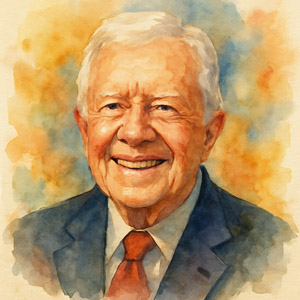~ Jimmy Carter
 James Earl Carter, Jr. (1924–2024) was born on this day in Plains, Georgia, a place he described as “the center of my life.” A devout Baptist, America’s 39th President began as a peanut farmer, proud that his efforts produced “the best seed peanuts in the country, perhaps the world.”
James Earl Carter, Jr. (1924–2024) was born on this day in Plains, Georgia, a place he described as “the center of my life.” A devout Baptist, America’s 39th President began as a peanut farmer, proud that his efforts produced “the best seed peanuts in the country, perhaps the world.”
After 11 years as a naval officer, Carter was elected Governor of Georgia in 1970, then President in 1976. His administration achieved the Panama Canal treaties, the Camp David Accords, and the peace treaty between Egypt and Israel. “Politics is hard,” he confessed. “It’s a brutal environment, but also gratifying.”
Post-presidency, Carter devoted his time to world peace and human rights, leading by example. He built houses for Habitat for Humanity, founded the Carter Center, and fought disease and hunger in Africa through Global 2000.
In 2002, Carter was awarded the Nobel Peace Prize for his decades of humanitarian work. That same year, he became the first U.S. President in or out of office to visit Cuba since Fidel Castro’s 1959 revolution.
Dr. M.S. Swaminathan, an agricultural scientist in India, described Carter as “the American Gandhi.”
President Carter’s compassion and service teach us that true leadership begins with the courage to care for others, near and far.
 Lead with love. 🤝💙
Lead with love. 🤝💙
